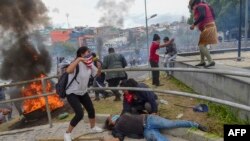Ecuador has experienced days of unrest since President Lenín Moreno canceled government subsidies on fuel prices. His decision to end the government’s support for low oil prices set off protests and clashes across the South American country.
The protests led Moreno to move his administration from Quito, the capital, to the port of Guayaquil.
On Tuesday, thousands of native people traveled to Quito and took part in anti-government protests. Protesters broke through police barriers and entered the empty congress building. Police fired tear gas and forced them to flee.
The government ordered an overnight curfew around major government buildings, as well as airports and oil production centers.
A government spokesman reported that about 570 people have been arrested for crimes including attacks on people and property.
There have been reports of people stealing goods from businesses and signs of food shortages in some markets. Many Ecuadorians already struggle to meet basic needs.
The government says economic losses from the street protests are costing the country $70 million a day. That is likely to increase public dissatisfaction the longer the protests continue.
The Organization of American States has called for talks to end the unrest in Ecuador. It also said that Moreno was the country’s constitutionally elected leader.
Reasons for the unrest
Last week, the president declared an end to government subsidies that had kept fuel prices low. He said the move was part of a number of measures designed to energize Ecuador’s economy. The announcement led transport workers to go on strike. They returned to work a few days later. But clashes involving young people and members of Ecuador’s native population have kept up pressure on the government.
The Associated Press says the widespread unrest shows a sense of alienation among many people who were already suffering economic hardship.
Some economic problems have resulted from the high public debt left by the administration of President Rafael Correa. He served 10 years in office, from 2007 to 2017. Like Correa, Moreno has sought credit with international agencies, especially the International Monetary Fund.
Possible change of leadership?
Some experts believe Moreno is not in immediate danger of being ousted or forced to resign. He appears to have the support of the military.
In addition, the political opposition is divided between those moving away from the ideas of the Correa administration and supporters of the former leader. His administration was marked by corruption concerns.
Ecuador has experienced political unrest in the past.
In 2005, President Lucio Gutiérrez, a former military officer, resigned after several days of protests. The military approved of his resignation, which followed growing opposition to some of his policies and the removal of top judges.
Gutiérrez was replaced by his vice president, Alfredo Palacio. Gutiérrez later attempted to regain the presidency, but lost to Correa.
I’m Jonathan Evans.
Gonzalo Solano reported this story for the Associated Press news agency. Jonathan Evans adapted his report for VOA Learning English. George Grow was the editor.
________________________________________________________________
Words in This Story
alienation – n. a withdrawing or separation of a person or a person's affections from an object or position of former attachment






